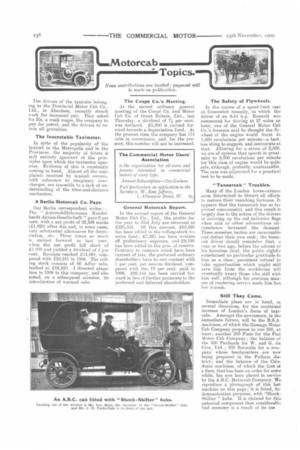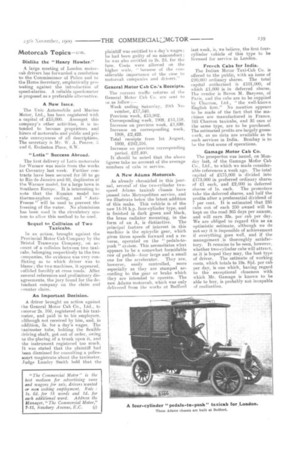Motorcab Topics.
Page 6

Page 7

If you've noticed an error in this article please click here to report it so we can fix it.
News contributions are invited: payment will be marle on publiralion.
The drivers of the taxicabs belonging to the Provincial Motor Cab Co., Ltd., in Aberdeen, recently struck work for increased pay. They asked for 25s. a week wages, the company to pay for petrol, and the drivers to retain all gratuities.
The Inscrutable Taximeter.
In spite of the popularity of the taxicab in the Metropolis and in the Provinces, the majority of hirers is still entirely ignorant of the principles upon which the taximeter operates. Evidence of this is constantly coming to hand. Almost all the complaints received by taxicab owners, with reference to imaginary overcharges, are traceable to a lack of understanding of the time-and-distance mechanism.
A Berlin Motorcab Co. Pays.
Our Berlin correspondent writes :---The " Autnrnobilfuhrwesen Kandelhardt Aktien-Gesellsehaft " pays 6 per cent. with a net profit of 32,399 marks (E1,620) after due and, in some cases, very substantial allowances for depreciation, etc. Three times as much is carried forward as last year, when the net profit fell short of £.1,000 and yielded a dividend of 1 per cent. Receipts reached £14,081, compared with C10,241 in 1908. The rolling stock consists of 60 Adler cabs, booked at £18,950. I directed attention in 1998 to this company, and also noted, on a subsequent occasion, its introduction of warmed cabs. The Coupe Co.'s Meeting.
At the second ordinary general meeting of the Coops Co. and Motor Cab Co. of Great Britain, Ltd., last Thursday, a dividend of VI per cent. was declared. £5,000 is carried forward towards a depreciation fund. At the present time the company has 174 cabs in commission, and, for the present, this number will not be increased.
General Motorcab Report.
In the annual report of the General Motor Cab Co., Ltd., the profits for the year to 31st July are returned as £225,554. Of this amount., 12.65,631 has been added to the rolling-stock reserve fund ; £7,225 has been written off preliminary expenses, and £9,199 has been added to the genc. al reserve. Contrary to rumours which have been current of late, the preferred ordinary shareholders have to rest content with 7 per cent. per annum dividend, compared with the 13 per cent, paid in 1908. £92,144 has been carried forward in lieu of further payments to the preferred and deferred shareholders. The Safety of Flywheels.
In the course of a speed-limit ease at Greenwich recently, in which the driver of an 8-10 h.p. Renault was summoned for driving at 27 miles an hour, one of the General Motor Cab Co.'s foremen said he thought the flywheel of the engine would burst at 1,690 revolutions per minute—a tactless thing to suggest, and inaccurate at that. Allowing for a stress of 2,500, we are of opinion that speeds in proximity to 3,000 revolutions per minute for this class of engine would he quite safe, although, probably, unattainable. The case was adjourned for a practical test to be made.
"Tannercab" Troubles.
Many of the London horse-cabmen seem determined to thwart all efforts to restore their vanishing fortunes. It it ore ars that the tannercab has so far proved unsuccessful, and this result is largely due to the action of the drivers in covering up the red indicator flags when rain or other adventitious circumstance increased the demand. These senseless tactics are inexcusable and defeat their own ends ; the horsecab driver should remember that, a year or two ago, before the advent of his horseleas rival, the public rightly entertained no particular gratitude to him as a class ; persistent refusal to take opportunities which might still save him from the workhouse will r,ventually weary those who still wish him well, although his previous manner of rendering service made him but few friends.
Still They Come.
Immediate plans are in hand, in several directions, for the continued increase of London's fleets of taxicabs. Amongst the newcomers, in the immediate future, will be the B.S.A. machines, of which the Gamage Motor Cab Company proposes to run 250, at least; another 200 Fiats for the Fiat Motor Cab Company ; the balance of the 500 Panhards for W. and G. du Cros, Ltd.; 200 Renaults for a company whose headquarters are now being prepared in the Fulham dietrict; and the balance of the Cale(Ionia machines, of which the first of a fleet, that has been on order for some while, ha-s now been plated in service by the A.B.C. Motorcah Company. We reproduce a photograph of this last machine on this page; it is fitted, for demonstration purposes, with "ShockShifter " hubs. It is claimed for this patented component that considerable fuel economy is a result of its use. Dislike the "Henry Howler."
A large meeting of London motorcab drivers has forwarded a resolution to the Commissioner of Police and to the Home Secretary, emphatically protesting against the introduction of speed-alarms. A reliable speedometer is proposed as a preferable alternative.
A New Isste.
The linic Automobile and Marine Motor, Ltd., has been registered with a capital of £15,000. Amongst this company's other activities, it is intended to become proprietors and hirers of motorcabs and public and private conveyances of all descriptions. The secretary is Mr. W. A. Pearce. 5 and 6, Eecleston Place, S.W.
"Letts" Success Abroad.
The first delivery of Lotis motorcabs for Warsaw was made from the works at Coventry last week. Further contracts have been secured for 50 to go to Rio de Janeiro and 60, duplicates of the Warsaw model, for a large town in Southern Europe. It is interesting to note that the Russian model fins thermo-syphon cooling, and " AntiFreeze " will be used to prevent the freezing of the water. No aluminium has been used in the circulatory system to allow this method to be used.
Sequel to Collision of Two Ta xic abs,
In an action, brought against the Provincial Motor Cab Company by the Bristol Tramways Company, on account of a collision between two taxicabs, belonging respectively to the two companies, the evidence was very conflicting as to which driver was to blame ; the two machines, it appeared, collided forcibly at cross roads. After several references and preliminary disagreements, the jury found for the defendant company on the claim and counter claim.
An Important Decision.
A driver brought an action against the General Motor Cab Co., Ltd., to recover 2s. 1CId. registered on his taximeter, and paid in to his employers. although not received by him, and, in addition, 5s. for a day's wages. The taximeter tube, holding the flexible driving shaft, got out of order, owing to the placing of a trunk upon it, and the instrument registered too much. It was stated that the plaintiff had been dismissed for consulting a policeeourt magistrate about the taximeter. Judge Lumley Smith held that the plaintiff was entitled to a day's wages; he had been guilty of no misconduct ; lie was also entitled to 2s. 2d. for the fare. Costs were allowed on the higher scale, •' because of the considerable importance of the case to motorcab companies and drivers."
General Motor Cab Co.'. Receipts. The current traffic returns of the General Motor Cab Co. are sent to us as follow :—
Week ending Saturday, 20th November, £17,540.
Previous week, £15,902.
Corresponding week, 1908, .C15,118. Increase on previous week, £1,638. Increase on corresponding week, 1908, £2,423. Total receipts from 1st August, 1909, £242,516. Increase on previous corresponding period. £22,460. It should be noted that the above figures take no account of the average numbers of cabs in service.
A New Adams Motorcab.
As already chronicled in this journal, several of the two-cylinder twospeed Adams taxicab chassis have passed into Metropolitan service, and we illustrate below the latest addition of this make. This vehicle is of the new 14-16 h.p. four-cylinder type, and is finished in dark green and black, the brass radiator mounting, in the form of an A, is distinctive. The principal featnre of interest in this machine is the epicyclic gear, which gives three speeds forward and a reverse, operated on the " pedals-topush " system. This necessitates what appears to be a somewhat formidable row of pedals—four large and a small one for the accelerator. They are, however, easily controlled, more especially as they are stamped according to the gear or brake which they are intended to operate. The new Adams motorcab, which was only delivered from the works at Bedford last week, is, we believe, the first fourcylinder vehicle of this type to be licensed for service in London.
French Cabs for India.
The Indian Motor Taxi-Cab Co. is offered to the public, with an issue of £90,000 ordinary shares. The total capital authorized is £101,000, of which £1,000 is in deferred shares. The vendor is Baron M. Baey-ens, of Paris, and the cabs are to be supplied by Charron, Ltd., " the well-known FInglisli firm." No mention appears to be made of the fact that the machines are manufactured in France. 165 Charron taxicabs, and 35 cars of the same type, are to be purchased. The estimated profits are largely guesswork, as no data are available as to such services in India. Bombay is to be the first scene of operations.
Gamage Motor Cab Co.
The prospectus was issued, on Monday last, of the Gamage Molor Cab Co.. Ltd., to which we made considerable references a week ago. The total capital of £175,000 is divided into £173,000 in preferred ordinary shares of £1 each, and £2,000 in deferred shares of is. each. The promoters take the deferred shares, and half the profits after a preferential dividend of 7 per cent. It is estimated that 235 cabs out of each 250 owned will be kept on the road 365 days per annum, and will earn 33s. per cab per day. We are obliged to regard this as an optimistic estimate, although we do not say it is impossible of achievement if everything goes well, and if the management ,is thoroughly satisfactory. It remains to be seen, however. whether two-cylinder cabs will attract, as it is hoped they may, the best type of driver. The estimate of working costs, which totals to 19s. Sicl. per cab per day, is one which, having regard to the exceptional closeness with which Mr. Giunage is known to be able to buy, is probably not incapable of realization.




















